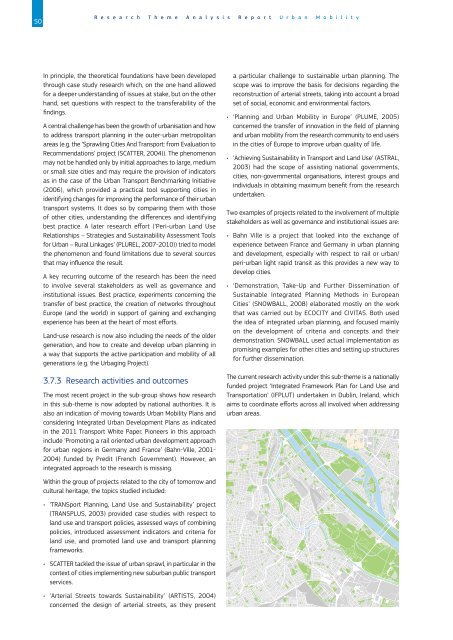Research Theme Analysis Report Urban Mobility
TRIP_Urban_Mobility_brochure-12.04.2016.pdf?utm_content=buffer91143&utm_medium=social&utm_source=twitter
TRIP_Urban_Mobility_brochure-12.04.2016.pdf?utm_content=buffer91143&utm_medium=social&utm_source=twitter
Create successful ePaper yourself
Turn your PDF publications into a flip-book with our unique Google optimized e-Paper software.
50<br />
R e s e a r c h T h e m e A n a l y s i s R e p o r t U r b a n M o b i l i t y<br />
In principle, the theoretical foundations have been developed<br />
through case study research which, on the one hand allowed<br />
for a deeper understanding of issues at stake, but on the other<br />
hand, set questions with respect to the transferability of the<br />
findings.<br />
A central challenge has been the growth of urbanisation and how<br />
to address transport planning in the outer-urban metropolitan<br />
areas (e.g. the ‘Sprawling Cities And Transport: from Evaluation to<br />
Recommendations’ project (SCATTER, 2004)). The phenomenon<br />
may not be handled only by initial approaches to large, medium<br />
or small size cities and may require the provision of indicators<br />
as in the case of the <strong>Urban</strong> Transport Benchmarking Initiative<br />
(2006), which provided a practical tool supporting cities in<br />
identifying changes for improving the performance of their urban<br />
transport systems. It does so by comparing them with those<br />
of other cities, understanding the differences and identifying<br />
best practice. A later research effort (‘Peri-urban Land Use<br />
Relationships – Strategies and Sustainability Assessment Tools<br />
for <strong>Urban</strong> – Rural Linkages’ (PLUREL, 2007-2010)) tried to model<br />
the phenomenon and found limitations due to several sources<br />
that may influence the result.<br />
A key recurring outcome of the research has been the need<br />
to involve several stakeholders as well as governance and<br />
institutional issues. Best practice, experiments concerning the<br />
transfer of best practice, the creation of networks throughout<br />
Europe (and the world) in support of gaining and exchanging<br />
experience has been at the heart of most efforts.<br />
Land-use research is now also including the needs of the older<br />
generation, and how to create and develop urban planning in<br />
a way that supports the active participation and mobility of all<br />
generations (e.g. the Urbaging Project).<br />
3.7.3 <strong>Research</strong> activities and outcomes<br />
The most recent project in the sub-group shows how research<br />
in this sub-theme is now adopted by national authorities. It is<br />
also an indication of moving towards <strong>Urban</strong> <strong>Mobility</strong> Plans and<br />
considering Integrated <strong>Urban</strong> Development Plans as indicated<br />
in the 2011 Transport White Paper. Pioneers in this approach<br />
include ‘Promoting a rail oriented urban development approach<br />
for urban regions in Germany and France’ (Bahn-Ville, 2001-<br />
2004) funded by Predit (French Government). However, an<br />
integrated approach to the research is missing.<br />
a particular challenge to sustainable urban planning. The<br />
scope was to improve the basis for decisions regarding the<br />
reconstruction of arterial streets, taking into account a broad<br />
set of social, economic and environmental factors.<br />
• ‘Planning and <strong>Urban</strong> <strong>Mobility</strong> in Europe’ (PLUME, 2005)<br />
concerned the transfer of innovation in the field of planning<br />
and urban mobility from the research community to end users<br />
in the cities of Europe to improve urban quality of life.<br />
• ‘Achieving Sustainability in Transport and Land Use’ (ASTRAL,<br />
2003) had the scope of assisting national governments,<br />
cities, non-governmental organisations, interest groups and<br />
individuals in obtaining maximum benefit from the research<br />
undertaken.<br />
Two examples of projects related to the involvement of multiple<br />
stakeholders as well as governance and institutional issues are:<br />
• Bahn Ville is a project that looked into the exchange of<br />
experience between France and Germany in urban planning<br />
and development, especially with respect to rail or urban/<br />
peri-urban light rapid transit as this provides a new way to<br />
develop cities.<br />
• ‘Demonstration, Take-Up and Further Dissemination of<br />
Sustainable Integrated Planning Methods in European<br />
Cities’ (SNOWBALL, 2008) elaborated mostly on the work<br />
that was carried out by ECOCITY and CIVITAS. Both used<br />
the idea of integrated urban planning, and focused mainly<br />
on the development of criteria and concepts and their<br />
demonstration. SNOWBALL used actual implementation as<br />
promising examples for other cities and setting up structures<br />
for further dissemination.<br />
The current research activity under this sub-theme is a nationally<br />
funded project ‘Integrated Framework Plan for Land Use and<br />
Transportation’ (IFPLUT) undertaken in Dublin, Ireland, which<br />
aims to coordinate efforts across all involved when addressing<br />
urban areas.<br />
Within the group of projects related to the city of tomorrow and<br />
cultural heritage, the topics studied included:<br />
• ‘TRANSport Planning, Land Use and Sustainability’ project<br />
(TRANSPLUS, 2003) provided case studies with respect to<br />
land use and transport policies, assessed ways of combining<br />
policies, introduced assessment indicators and criteria for<br />
land use, and promoted land use and transport planning<br />
frameworks.<br />
• SCATTER tackled the issue of urban sprawl, in particular in the<br />
context of cities implementing new suburban public transport<br />
services.<br />
• ‘Arterial Streets towards Sustainability’ (ARTISTS, 2004)<br />
concerned the design of arterial streets, as they present


